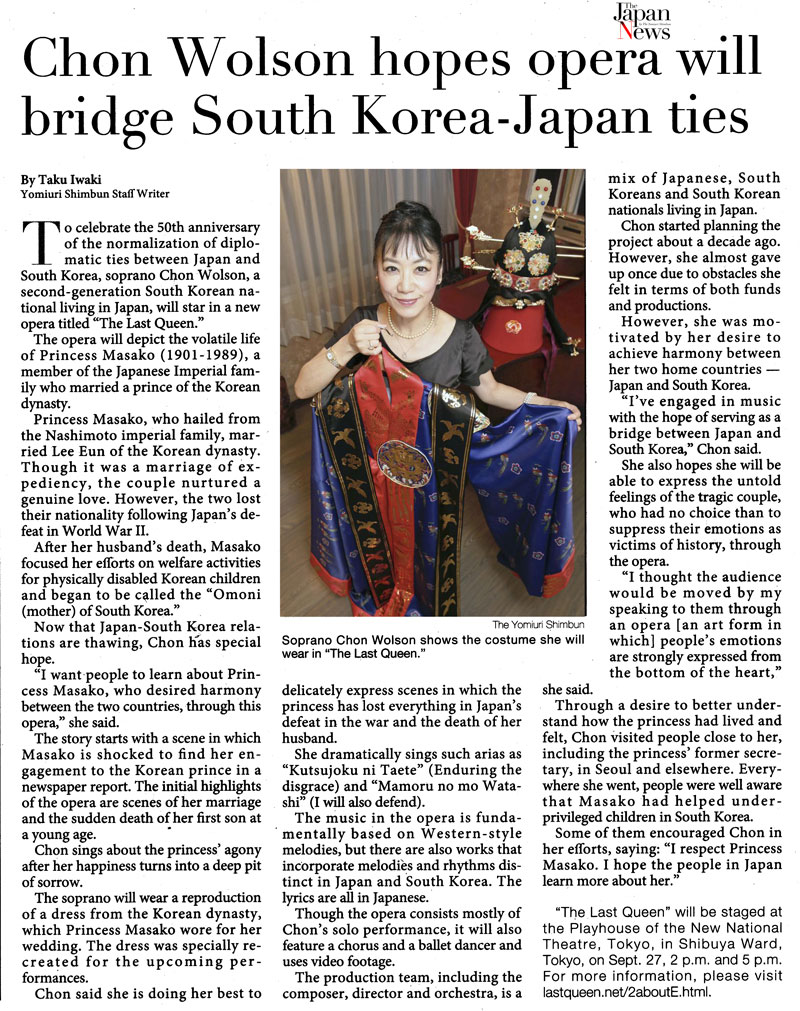
Soprano Chon Wolson shows the costume she will wear in “The Last Queen.”
6:52 am, September 21, 2015
By Taku Iwaki / Yomiuri Shimbun Staff Writer
To celebrate the 50th anniversary of the normalization of diplomatic ties between Japan and South Korea, soprano Chon Wolson, a second-generation South Korean national living in Japan, will star in a new opera titled “The Last Queen.”
The opera will depict the volatile life of Princess Masako (1901-1989), a member of the Japanese Imperial family who married a prince of the Korean dynasty.
Princess Masako, who hailed from the Nashimoto imperial family, married Lee Eun of the Korean dynasty. Though it was a marriage of expediency, the couple nurtured a genuine love. However, the two lost their nationality following Japan’s defeat in World War II.
After her husband’s death, Masako focused her efforts on welfare activities for physically disabled Korean children and began to be called the “Omoni (mother) of South Korea.”
Now that Japan-South Korea relations are thawing, Chon has special hope.
“I want people to learn about Princess Masako, who desired harmony between the two countries, through this opera,” she said.
The story starts with a scene in which Masako is shocked to find her engagement to the Korean prince in a newspaper report. The initial highlights of the opera are scenes of her marriage and the sudden death of her first son at a young age.
Chon sings about the princess’ agony after her happiness turns into a deep pit of sorrow.
The soprano will wear a reproduction of a dress from the Korean dynasty, which Princess Masako wore for her wedding. The dress was specially re-created for the upcoming performances.
Chon said she is doing her best to delicately express scenes in which the princess has lost everything in Japan’s defeat in the war and the death of her husband.
She dramatically sings such arias as “Kutsujoku ni Taete” (Enduring the disgrace) and “Mamoru no mo Watashi” (I will also defend).
The music in the opera is fundamentally based on Western-style melodies, but there are also works that incorporate melodies and rhythms distinct in Japan and South Korea. The lyrics are all in Japanese.
Though the opera consists mostly of Chon’s solo performance, it will also feature a chorus and a ballet dancer and uses video footage.
The production team, including the composer, director and orchestra, is a mix of Japanese, South Koreans and South Korean nationals living in Japan.
Chon started planning the project about a decade ago. However, she almost gave up once due to obstacles she felt in terms of both funds and productions.
However, she was motivated by her desire to achieve harmony between her two home countries — Japan and South Korea.
“I’ve engaged in music with the hope of serving as a bridge between Japan and South Korea,” Chon said.
She also hopes she will be able to express the untold feelings of the tragic couple, who had no choice than to suppress their emotions as victims of history, through the opera.
“I thought the audience would be moved by my speaking to them through an opera [an art form in which] people’s emotions are strongly expressed from the bottom of the heart,” she said.
Through a desire to better understand how the princess had lived and felt, Chon visited people close to her, including the princess’ former secretary, in Seoul and elsewhere. Everywhere she went, people were well aware that Masako had helped underprivileged children in South Korea.
Some of them encouraged Chon in her efforts, saying: “I respect Princess Masako. I hope the people in Japan learn more about her.”
“The Last Queen” will be staged at the Playhouse of the New National Theatre, Tokyo, in Shibuya Ward, Tokyo, on Sept. 27, 2 p.m. and 5 p.m. For more information, please visit lastqueen.net/2aboutE.html.Speech
|